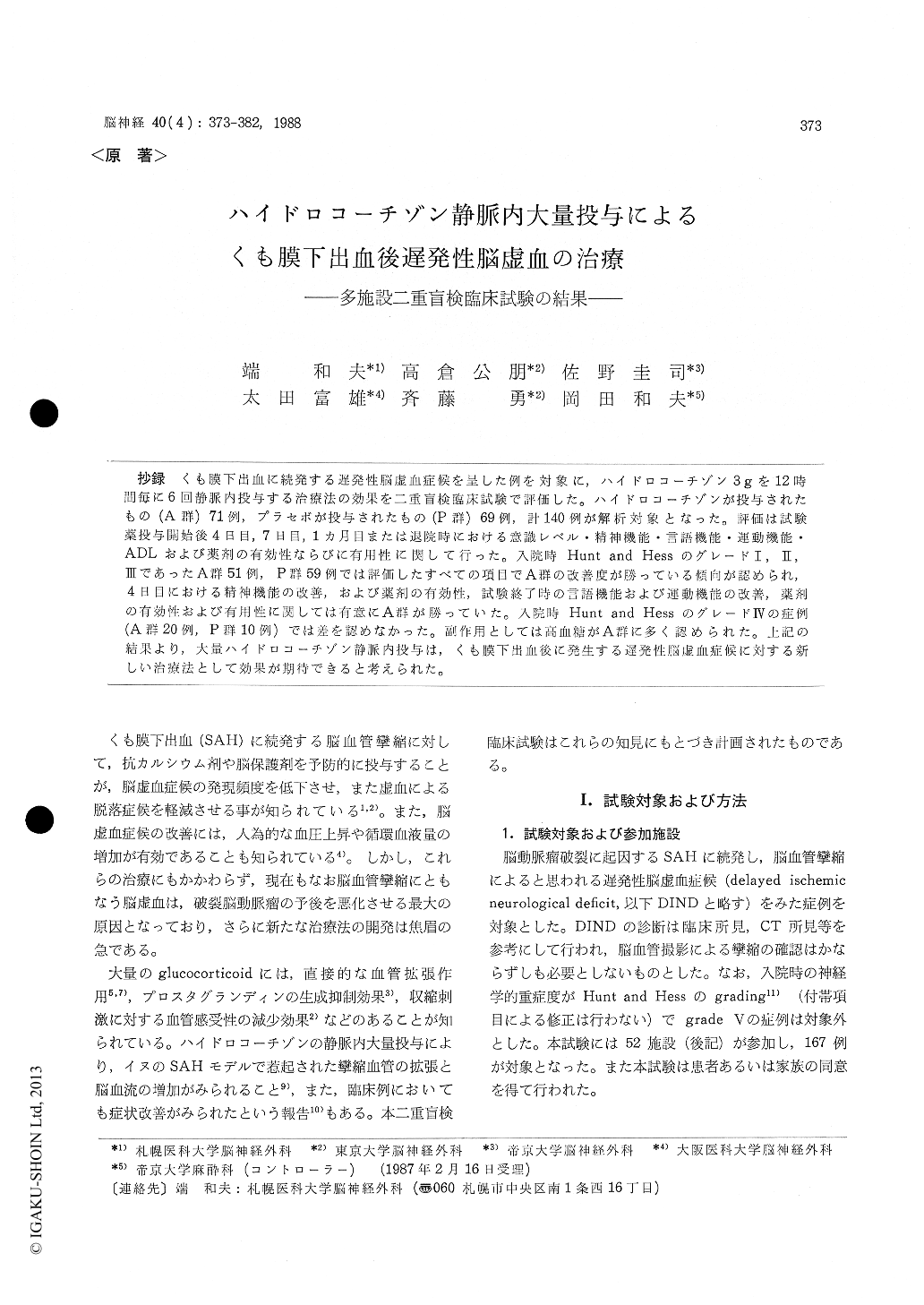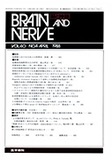Japanese
English
- 有料閲覧
- Abstract 文献概要
- 1ページ目 Look Inside
抄録 くも膜下出血に続発する遅発性脳虚血症候を呈した例を対象に,ハイドロコーチゾン3gを12時間毎に6回静脈内投与する治療法の効果を二重盲検臨床試験で評価した。ハイドロコーチゾンが投与されたもの(A群)71例,プラセボが投与されたもの(P群)69例,計140例が解析対象となった。評価は試験薬投与開始後4日目,7日目,1カ月目または退院時における意識レベル・精神機能・言語機能・運動機能・ADLおよび薬剤の有効性ならびに有用性に関して行った。入院時Hunt and HessのグレードI,II,IIIであったA群51例,P群59例では評価したすべての項目でA群の改善度が勝っている傾向が認められ,4日目における精神機能の改善,および薬剤の有効性,試験終了時の言語機能および運動機能の改善,薬剤の有効性および有用性に関しては有意にA群が勝っていた。入院時Hunt and HessのグレードIVの症例(A群20例,P群10例)では差を認めなかった。副作用としては高血糖がA群に多く認められた。上記の結果より,大量ハイドロコーチゾン静脈内投与は,くも膜下出血後に発生する遅発性脳虚血症候に対する新しい治療法として効果が期待できると考えられた。
Glucocorticoid in high dose has known to reduce vascular sensitivity to various vasoconstrictive stmiuli. It inhibits phospholipase to reduce pro-duction of prostaglandins. It stabilizes the cell membrane and prevents cerebral edema. All these pharmacological effects indicate possible usefulness of this drug for the treatment of cerebral ischemia due to vasospasm. Based on these theoretical backgrounds a multi-center controlled double blind clinical study was carried out.
The patient who showed manifestations of de-layed cerebral ischemia due to vasospasm were selected for this study. As soon as the clinical manifestation appeared, the patient was given either 3 grams of hydrocortisone intravenously ina 60 ml solution or the placebo. The administra-tion was repeated 6 times with interval of 12 hours. The patients were allowed to be treated accord-ing to the independent protocol of each institute except for the maximum daily use of glucocor-ticoid. The effect of the therapy was evaluated at 4 th, 7 th day and 1 month after the initia-tion. The study involved 52 institutes and a total of 140 patients, seventy-one patients who received hydrocortisone (group A) and 69 patients who received placebo (group P) was analysed. There were no significant differences in background data between both groups.
In patients with grade I, II or III on admis-sion, the favorable effects of hydrocortisone were demonstrated on changes in neurological findings. In group A, there were significantly more cases of improvement at 4 th day for orientation about place and person. At 1 month or on discharge group A showed significant improvement almost in every aspect of neurological findings including mental, speech and motor functions. In patients with grade III on admission these effects of hy-drocortisone were more apparent. The final out-come was favorable in 58 percents in group A and 41% in group P, but these figures did not reach the level of statistical significance.
As regard to the side effect group A showed higher incidence of hyperglycemia, but it was easily controlled by administration of insulin. There was no serious side effect attributed to hydrocor-tisone.
The general usefulness of this therapy was judged significantly useful. A large dose of hydro-cortisone, 3 grams twice daily can be used as a form of medication to treat cerebral ischemia due to vasospasm.

Copyright © 1988, Igaku-Shoin Ltd. All rights reserved.


